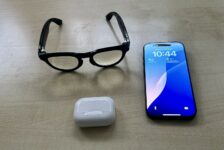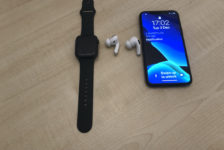In the realm of modern technology, the intersection of corporate practices and accessibility for disabled people presents a complex landscape. As technology continues to evolve, it’s important to scrutinise the ways in which these advancements either bridge or widen the gap for disabled people.
Among the giants in the tech industry, Apple has this week come under scrutiny for its alleged monopoly practices. The US Department of Justices (DOJ) antitrust lawsuit didn’t mention accessibility, nor did the press reporting the news, but I am concerned about the impact of Apple’s “walled garden” approach on accessibility for disabled users.
The monopoly concern: Apple’s accessibility dilemma
Apple, known for its innovation and tightly integrated ecosystem, has been accused by the DOJ of restricting key access methods to their devices.
For me, a case in point is the “Messaging with Siri” feature, which is liberating for hands-free messaging for people who have mobility impairments. However, it only works with Apple’s AirPods and not with other Bluetooth devices such as Ray-Ban Meta smart glasses.
Sadly, the phone you have largely dictates which Bluetooth earbuds and smartwatches you can buy. I think this situation sucks when it comes to widening accessibility.
Another example is voice dictation and the way third party developers of dictation applications have been forced out of the Apple ecosystem because of restrictions the company places on its APIs.
These limitations raise questions about the broader implications for assistive technologies, such as dictation applications and non-Apple earbuds, smart watches, and smart glasses, which could potentially offer significant benefits to disabled users on Apple platforms.
A glimpse into the DOJ’s accusations
The DOJ has not shied away from highlighting specific concerns regarding Apple’s practices. In a complaint that has even Apple’s staunchest supporters pausing for thought, the DOJ points to the “green bubble” issue with problems messaging Android users on iPhones, as emblematic of Apple’s restrictive policies. This issue, while seemingly minor to some, underscores a larger debate about inclusivity and the role of major corporations in ensuring their technologies are accessible to all.
The ripple effects of product decisions
The discontinuation of Nuance’s Dragon Professional for Mac dictation software in 2018 is a poignant example of how seemingly business-driven decisions can have profound impacts on disabled people. For those who relied on this software for communication, its absence left a void that isn’t easily filled by existing alternatives, including Apple’s own replacement Voice Control. This situation serves as a stark reminder of the essential role that accessibility-focused technologies play in the lives of disabled people.
The quest for alternatives
For Mac users affected by Nuance’s decision, finding an equivalent replacement has proven challenging. Apple’s own voice dictation software, while an alternative, falls short in comparison to Dragon’s capabilities, particularly in learning from user corrections and handling specialised vocabulary. This dilemma highlights a broader issue: the need for comprehensive, user-friendly accessibility tools that can cater to the diverse needs of all users.
A call to action for Apple
Apple’s role in this landscape is twofold. On one hand, the company’s stringent control over its ecosystem has contributed to the challenges faced by third-party developers like Nuance, limiting their ability to offer fully featured applications on Apple platforms. On the other hand, Apple is uniquely positioned to lead by example in the development of advanced accessibility tools, which, to its credit, in many ways it does.
The potential for cross-platform messaging
A notable area for improvement is Apple’s messaging system and in particular Messaging with Siri. The need for the proprietary H chip in AirPods aside, Apple could have made a better cross-platform messaging experience where other Bluetooth earbuds and smart glasses could use Siri Messaging for seamless hands-free messaging.
If you wear the Ray-Ban Meta smart glasses, for the accessibility advantages they offer, and connect them to an iPhone, they won’t read out iMessages to you, and you can’t send iMessages either but you can dictate and send normal SMS messages. In contrast, there are no restrictions with messaging if you use Apple’s own AirPods.
I understand that Apple’s H chip technology enables Messaging with Siri when you wear Apple’s AirPods, and it’s reasonable for the company to initially keep this feature exclusive. However, considering its immense potential to enhance accessibility, I propose that after an exclusivity period of two to three years, Apple should make Messaging with Siri accessible to non-Apple devices. Apple has previously demonstrated a readiness to embrace openness, as seen in their decision to donate the HomeKit architecture to the Matter protocol. This precedent suggests that a similar approach could be beneficial in making Messaging with Siri more widely available, thereby supporting greater inclusivity.
By opening up its platforms to allow for better integration with other Bluetooth devices, including smart glasses, and smart watches, as well as dictation applications, Apple has the opportunity to significantly enhance the messaging and dictating experience for disabled people. This move would not only demonstrate Apple’s commitment to accessibility but also pave the way for future innovations in assistive technology.
Embracing the future of inclusive technology
Whilst I really appreciate the joined up Apple ecosystem that brings security, privacy, and convenience I do question whether it sometimes comes at the expense of innovations in accessibility.
As we navigate the complexities of technology and accessibility, it’s clear that the path forward requires a collaborative effort. By opening up and engaging in open dialogue and prioritising inclusivity, companies like Apple can lead the charge in breaking down barriers and fostering a more accessible digital world. Through innovation and empathy, the potential to create technology that empowers everyone, regardless of their abilities, is within our reach.
It’s worth stating that Apple is already a leader in accessibility features on its platforms and does more than many tech companies in this area.
The company has pledged to fight the DOJ lawsuit: “This lawsuit threatens who we are and the principles that set Apple products apart in fiercely competitive markets,” Apple said in an emailed statement. “If successful, it would hinder our ability to create the kind of technology people expect from Apple—where hardware, software, and services intersect. It would also set a dangerous precedent, empowering government to take a heavy hand in designing people’s technology. We believe this lawsuit is wrong on the facts and the law, and we will vigorously defend against it.”






